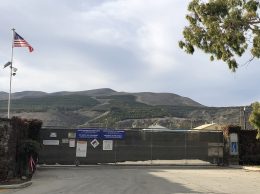Dubroff: Mental trauma from deadly fire and mudslides will linger
IN THIS ARTICLE
- Columns Topic
- Henry Dubroff Author
By Henry Dubroff Friday, January 19th, 2018

Henry Dubroff
“After the fire, the fire still burns.”
The title of the 1985 Roger Daltrey music video does a lot to explain why I was on the phone with American Red Cross experts on Jan. 16, learning that mental health is an important part of disaster recovery.
I have joked that as an evacuee from the Thomas fire in December and the Montecito mudslide in January, I have PTSD on top of my PTSD.
But after the adrenaline rush of evacuation and directing our news coverage and keeping our business on track began to wear off, a feeling of fatigue and sadness set in. True, I was not injured, my rented cottage is intact and yesterday I even rescued my car thanks to a friend who helped me convince sheriff’s deputies to let me into the evacuation zone.
Like many evacuees, I don’t need food, clothing or a place to sleep. I have financial resources and maybe someday insurance will offset some of my costs.
But Carol Gross, a disaster mental health expert imported from the state of Washington, said that it’s really the mental health issues that are ubiquitous and long lasting.
“Being disoriented, having difficulty sleeping, being cranky and fighting with family and friends,” she said, “are normal and expected reactions to disaster.”
Many people are surprised at the mental health effects because they tell themselves, “I am OK because my house is all right.” Emotional impacts can extend far beyond victims to first responders and “people not directly impacted,” she added.
When symptoms increase or don’t diminish over time, Gross said, it’s time to start paying serious attention. One way of coping is to spend an hour a day at the beach or going for a picnic or enjoying a group activity. It’s important not to let your life be “defined by the disaster,” she said.
It’s also good to find ways to give back, to interact with friends and family and recognize that feelings known as “survivor guilt” are part of the brain’s natural response to disaster.
For a smaller number of us, there are powerful direct losses — deaths in the family or the loss of a family home. Kim Cantin, who lost her husband, whose son is missing, whose daughter was dramatically rescued and who was hospitalized with injuries, is a former MBA student of one of my best friends, Sam Culbert, a professor at the UCLA Anderson School of Business. Her eloquent statement about loss and survival was shared at a Jan. 16 community meeting.
What relatives of the 20 people who perished are experiencing is something like a death in the family although it is played out on the stage of global media attention. Finding the private space to grieve can be difficult, Gross said.
Cindy Huge, a public affairs specialist with the Red Cross, said social media is so omnipresent that family members can monitor Facebook posts to see if there are signs someone is overwhelmed. But the press of social media means some victims may want to increase privacy settings or reduce their circle of contacts to give families more private space.
The duration of this particular tragedy, stretching from the night of Dec. 5 when several of my friends lost homes in Ventura and three Business Times staffers were evacuated, to press time when I remained evacuated and half our staff is working remotely from Ventura or Ojai, also takes its toll.
“Lots of levels have been affected,” said Gross. “There are people who lost their jobs or businesses versus caring people who just feel the sadness.”
In the coming months, Gross and Huge said, some people come to recognize a disaster as a life-defining event. Communities that emerge stronger recognize that impacts are going to go on for a long, long time. Many victims will find strength in connecting with religious organizations or building a circle of friends.
For Jessica Piffero of the Central California Red Cross operation, one of the most useful resources is a disaster mental health hotline maintained 24/7 by the Department of Health and Human Services. The number is (800) 985-5990 and it offers multiple services in many different languages.
As time goes on, anniversaries will trigger more memorials and more emotion that is part of the process of coping with tragedy and moving forward.
After the fire, the fire does indeed still burn. Or as Red Cross expert Gross put it, “the ripples go out a long, long way.”
• Contact Editor Henry Dubroff at [email protected].
Related Articles
 Friday, October 14th, 2022
Friday, October 14th, 2022










